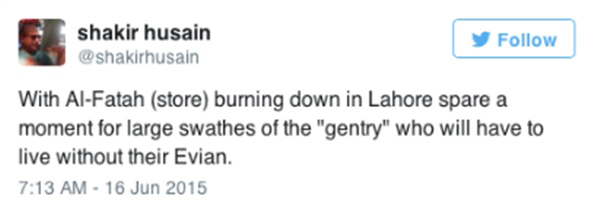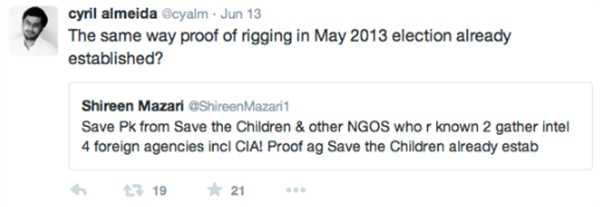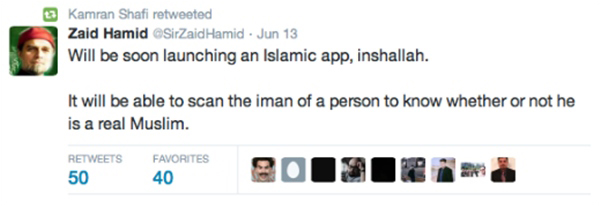
My chacha Iftikhar Hussain Chaudhry passed away last week. He was, I think, 68 years old, perhaps 69, probably 70. “I can’t tell you my exact age,” he once said to me, “because fifty years ago, nobody in our village bothered keeping birth records. It was Ayub Khan who first introduced the law that made it compulsory to register marriages and births.”
Iftikhar Hussain Chaudhry retired as the longest serving Chief Justice of the Lahore High Court, post-Partition. Born in a small village near Mangla in Jhelum, he was the youngest of four brothers. The eldest, Chaudhry Altaf Hussain, was twice governor of the Punjab and died with his boots on. In the middle were my father, Nassim Hussain, and my uncle, Javed Hussain Chaudhry. All four are now gone.
A clutch of uncles all grew up together. My paternal grandfather Chaudhry Mohammad Awais raised his younger brother’s children (my maternal uncles, Ijaz and Shahbaz Chaudhry) as part of the same family. Their grandfather and my great-grandfather had both been soldiers in the British army. The latter, Khan Bahadur Sher Baz Khan, had fought in the Chitral war and (like all Potoharis) was evidently a formidable soldier. In recognition of his services, he was awarded the title of “Khan Bahadur” and a fair-sized landholding in what was then the district of Montgomery. After retirement, he was made the zaildar of the police station area Ahmad Yar. The office of the zaildar was created by the British to manage groups of villages and collect revenues. After Khan Bahadur died, the zaildari devolved to my maternal grandfather, Chaudhry Shah Mohammad.


But back to Iftikhar Hussain Chaudhry. He was of the generation that probably saw the widest changes take place in the span of a lifetime. Take the simple matter of getting from here to there. “You have the luxury of traveling by car, doorstep to doorstep, from your village to your house in Lahore. It wasn’t quite as easy fifty years ago,” my chacha once retorted. In those days, he said, there was one train a week to the small station of Fitna, situated on the main Sahiwal–Multan road. A horse and cart was prepared for the zaildar sahib’s journey a day before (on occasion, he might ride the ten miles to the station on camelback). Tickets had to be booked at least seven days before traveling. A whole day’s journey would take one to Lahore. From there, one had to take the train back to the district headquarter, where the all-powerful deputy commissioner held his meetings. Mind you, the visit of the deputy commissioner to our village, Chak 119 EB, was no trifling matter. A visit from His Majesty King George V would have elicited no less pomp and circumstance.
Which brings up something else I used to wonder about. Why is it that our villages have numbers rather than names? Here’s what I discovered. The Sutlej River area between Faisalabad and Sahiwal, onto Vehari, Pakpattan and Okara was once all thick jungle. In 1900, the British conceived the brilliant idea of establishing a vast canal system to allow this area to be farmed. They planned new villages along the canals (some of which later developed into towns and cities such as Lyallpur and Montgomery). The areas adjacent to the canals become known as bars. The planned villages were allotted numbers and my village in Montgomery became 119 EB – for “eastern bar”.


Although – like thousands of other families from Rawalpindi – mine was allotted lands in Montgomery, our roots were in Jhelum where my grandfather, Mohammad Awais, rose to the highest elected office: the vice-chairman of Jhelum’s district council. In 1952, he was elected to the legislative assembly – a seat subsequently occupied by his eldest son, Altaf Hussain. During Ayub Khan’s martial law regime, Altaf Hussain was a key member of the opposition and one of Fatima Jinnah’s closest allies.
Despite their long association with high office, I suspect that my family’s proudest moment was when Fatima Jinnah came to live in our modest family house during her presidential campaign in 1964. My uncle Shahbaz Chaudhry, who was a young boy at the time, recalls leaders like Mumtaz Daultana and Shaukat Hayat and intellectuals like Habib Jalib spending the night there, content with a mattresses rolled out on the floor.



In those days, says Shahbaz Chaudhry, serving as the opposition party vis-à-vis the sitting government was no mean feat. It was, after all, Ayub Khan’s time. Recall the story about Bhalukhar Jutt, Jhelum’s very own don, who was so delighted on being elected councillor that he publically denounced his criminal ways and promised to compensate for his past by voting for Fatima Jinnah. He was picked up by the local police, summarily tortured and ordered to vote for Ayub Khan. Bhalukhar Jutt was too tough to give way and refused. In the end, they simply did not allow him to vote.
As Steve Jobs once said, “Death is very likely the single best invention of Life… it clears out the old to make way for the new.” Rest in peace, Judge sahib.
Follow the author @fawadchaudhry
Iftikhar Hussain Chaudhry retired as the longest serving Chief Justice of the Lahore High Court, post-Partition. Born in a small village near Mangla in Jhelum, he was the youngest of four brothers. The eldest, Chaudhry Altaf Hussain, was twice governor of the Punjab and died with his boots on. In the middle were my father, Nassim Hussain, and my uncle, Javed Hussain Chaudhry. All four are now gone.
A clutch of uncles all grew up together. My paternal grandfather Chaudhry Mohammad Awais raised his younger brother’s children (my maternal uncles, Ijaz and Shahbaz Chaudhry) as part of the same family. Their grandfather and my great-grandfather had both been soldiers in the British army. The latter, Khan Bahadur Sher Baz Khan, had fought in the Chitral war and (like all Potoharis) was evidently a formidable soldier. In recognition of his services, he was awarded the title of “Khan Bahadur” and a fair-sized landholding in what was then the district of Montgomery. After retirement, he was made the zaildar of the police station area Ahmad Yar. The office of the zaildar was created by the British to manage groups of villages and collect revenues. After Khan Bahadur died, the zaildari devolved to my maternal grandfather, Chaudhry Shah Mohammad.


Fatima Jinnah came to live in our modest family house during her presidential campaign
But back to Iftikhar Hussain Chaudhry. He was of the generation that probably saw the widest changes take place in the span of a lifetime. Take the simple matter of getting from here to there. “You have the luxury of traveling by car, doorstep to doorstep, from your village to your house in Lahore. It wasn’t quite as easy fifty years ago,” my chacha once retorted. In those days, he said, there was one train a week to the small station of Fitna, situated on the main Sahiwal–Multan road. A horse and cart was prepared for the zaildar sahib’s journey a day before (on occasion, he might ride the ten miles to the station on camelback). Tickets had to be booked at least seven days before traveling. A whole day’s journey would take one to Lahore. From there, one had to take the train back to the district headquarter, where the all-powerful deputy commissioner held his meetings. Mind you, the visit of the deputy commissioner to our village, Chak 119 EB, was no trifling matter. A visit from His Majesty King George V would have elicited no less pomp and circumstance.
Which brings up something else I used to wonder about. Why is it that our villages have numbers rather than names? Here’s what I discovered. The Sutlej River area between Faisalabad and Sahiwal, onto Vehari, Pakpattan and Okara was once all thick jungle. In 1900, the British conceived the brilliant idea of establishing a vast canal system to allow this area to be farmed. They planned new villages along the canals (some of which later developed into towns and cities such as Lyallpur and Montgomery). The areas adjacent to the canals become known as bars. The planned villages were allotted numbers and my village in Montgomery became 119 EB – for “eastern bar”.


Although – like thousands of other families from Rawalpindi – mine was allotted lands in Montgomery, our roots were in Jhelum where my grandfather, Mohammad Awais, rose to the highest elected office: the vice-chairman of Jhelum’s district council. In 1952, he was elected to the legislative assembly – a seat subsequently occupied by his eldest son, Altaf Hussain. During Ayub Khan’s martial law regime, Altaf Hussain was a key member of the opposition and one of Fatima Jinnah’s closest allies.
Despite their long association with high office, I suspect that my family’s proudest moment was when Fatima Jinnah came to live in our modest family house during her presidential campaign in 1964. My uncle Shahbaz Chaudhry, who was a young boy at the time, recalls leaders like Mumtaz Daultana and Shaukat Hayat and intellectuals like Habib Jalib spending the night there, content with a mattresses rolled out on the floor.



In those days, says Shahbaz Chaudhry, serving as the opposition party vis-à-vis the sitting government was no mean feat. It was, after all, Ayub Khan’s time. Recall the story about Bhalukhar Jutt, Jhelum’s very own don, who was so delighted on being elected councillor that he publically denounced his criminal ways and promised to compensate for his past by voting for Fatima Jinnah. He was picked up by the local police, summarily tortured and ordered to vote for Ayub Khan. Bhalukhar Jutt was too tough to give way and refused. In the end, they simply did not allow him to vote.
As Steve Jobs once said, “Death is very likely the single best invention of Life… it clears out the old to make way for the new.” Rest in peace, Judge sahib.
Follow the author @fawadchaudhry

